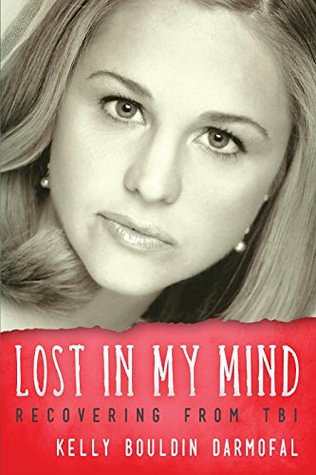Amanda’s Fall, with charming illustrations by Bijan Samaddar, depicts an event common in schools today. Young Amanda gets a concussion after falling and hitting her head during recess. While she can hear people talking, she cannot respond. Amanda is taken to a doctor for evaluation. Wisely, her parents ask for a prognosis, which in Amanda’s case, is a good one. Author Kelly Darmofal offers readers her third book on TBI (Traumatic Brain Injury), encouraging parents and caretakers to alert schools and, hopefully, doctors when any child is concussed; side effects can then be ameliorated.
Studies show that Traumatic Brain Injuries represent the leading cause of death and disability in young adults in industrialized countries. According to the CDC, at least 564,000 children are seen each year for brain injury in hospital emergency departments and released.
“Kelly Darmofal worked hard on recovering from severe TBI, and gained the special gift of ability to explain what she went through. This book offers transforming power to children and parents–those afflicted with TBI and those trying to prevent it.”
— Dr. Frank Balch Wood, professor emeritus of neurology-neuropsychology at Wake Forest School of Medicine and ordained Baptist minister
“Amanda’s Fall is a delightful, much needed children’s book on Traumatic Brain Injury. Through the eyes of a child, it raises awareness, has tips for coping and offers support for those affected.”
— Christina Condon NP, Neurology
“Amanda’s Fall is a lovely book that uses rhyme and colorful illustrations to engage young readers. Kelly Bouldin Darmofal’s warm writing style makes it easy to understand the issues surrounding this potentially serious medical condition.”
Laurie Zelinger, PhD, RPT-S, board certified psychologist and author of Please Explain Time Out to Me
“This is a cute and creative story to help young children understand their world after a traumatic brain injury. It teaches them that they are not alone in their experiences. The tips for parents are a valuable resource as well.” — Mary Jane Morgan, Lower School Principal, Calvary Day School
“Darmofal has an ease in the way she writes about TBI. In this sweet story, she makes a difficult situation approachable and something to discuss. This is a wonderful story to share and educate children about TBI.”
— Susie van der Vorst, co-Founder and Director, Camp Spring Creek
From Loving Healing Press www.LHPress.com
Lost in My Mind: Recovering From Traumatic Brain Injury (TBI) (Reflections of America)
Lost in My Mind is a stunning memoir describing Kelly Bouldin Darmofal’s journey from adolescent girl to special education teacher, wife and mother — despite severe Traumatic Brain Injury (TBI). Spanning three decades, Kelly’s journey is unique in its focus on TBI education in America (or lack thereof). Kelly also abridges her mother’s journals to describe forgotten experiences. She continues the narrative in her own humorous, poetic voice, describing a victim’s relentless search for success, love, and acceptance — while combating bureaucratic red tape, aphasia, bilateral hand impairment, and loss of memory. Readers will:
– Learn why TBI is a “silent illness” for students as well as soldiers and athletes.
– Discover coping strategies which enable TBI survivors to hope and achieve.
– Experience what it’s like to be a caregiver for someone with TBI.
– Realize that the majority of teachers are sadly unprepared to teach victims of TBI.
– Find out how relearning ordinary tasks, like walking, writing, and driving require intense determination.
101 Tips for Recovering from Traumatic Brain Injury: Practical Advice for TBI Survivors, Caregivers, and Teachers

Kelly Bouldin Darmofal suffered a severe TBI in 1992; currently she holds a Masters in Special Education from Salem College, NC. Her memoir Lost In My Mind: Recovering From Traumatic Brain Injury (TBI) tells her story of tragedy and triumph. Kelly will be teaching “TBI: An Overview for Educators” at Salem College. Kelly’s “tips” were learned during two decades of recovery and perseverance; they include:
– Ways to avoid isolation and culture shock post-TBI
– Tips for staying organized in the face of instant chaos
– Strategies for caretakers and teachers of TBI survivors
– Life philosophies that reject despair
– How to relearn that shoes must match
– Why one alarm clock is never enough, and
– A breath of humor for a growing population with a “silent illness”–TBI
About the Author

Kelly Bouldin Darmofal is currently a freelance writer, wife, educator and stay-at-home mother. Despite her 1992 severe closed head injury, she graduated cum laude in Communication from Salem College (2000), later receiving a Masters in Special Education from Salem (2006). She studied Spanish in Merida, Mexico and took courses at UCLA, UNC-CH, and Wake Forest University. Kelly was employed by the Winston-Salem, NC chapter of the American Red Cross as volunteer coordinator before working in ESL at Reynolds High School, followed by a semester in Special Education at Thomas Jefferson Middle School. Kelly worked personally with Dr. Bethanie Tucker, Averett University, to be trained in Tucker Signing Strategies for Reading (2005). In 2005 Kelly joined the Forsyth Country Day School faculty in the Johnson Academic Center as an LD Specialist. In 2007 Kelly accepted a 2nd grade position at Summit School, and taught there four years until the birth of her son. She currently tutors children as a Wilson Reading Specialist and is a published writer.
Her article on traumatic brain injury (TBI) and education was published in English Journal in 2005; “Our Teachers Are Not Prepared” won an Edwin M. Hopkins award in 2006 (NCTE). She is a feature contributor to Lost Treasure magazine, and has been a speaker on the subject of TBI at Wake Forest, Salem College, and the Summit School. With the publication of online articles related to TBI in addition to her memoir, Kelly continues to advocate for the TBI of America – especially students.
“No teacher in high school or college was trained to work with students like me,” says Kelly, the first TBI-certified student in her high school. She admits the American military and sports organizations are now attempting to address the TBI issue. However, IDEA, or the Individual with Disabilities Education Act, has made TBI a certifiable disability category (in 1990) without assuring appropriate teacher training. She remarks on this “black hole” in education whenever possible, and relates her early TBI experiences with hopes of affecting change.
Kelly has found canine care and rescue to be both a rewarding and healing hobby. Currently she owns two rescue mutts – Mitzy and Buddie.
Website Author on Facebook Twitter Goodreads Amazon Author Page Audible Author Page
 Amanda’s Fall: A Story for Children About Traumatic Brain Injury by Kelly Bouldin Darmofal
Amanda’s Fall: A Story for Children About Traumatic Brain Injury by Kelly Bouldin Darmofal
My rating: 5 of 5 stars
I was sent a copy of this book in exchange for my honest review. I was not financially compensated and all opinions are 100 percent mine.
First of all, while this is a children’s book, it does cover a serious topic, and this is not a book intended for a child to read by himself/herself. There are copious notes for the parents/caregivers as well as annotated lists for more research.
This is exactly the kind of book that is needed in today’s world. All too often, we tend to believe that head injuries are no big deal. It was as though falling on your head was considered a “rite of passage” when I was growing up (not that I ever did). This book covers a serious topic and is the idea teaching tool for all ages.
I have never read any book that deals with TBI, and the fact that the author herself has experienced this condition makes this book even better. While children may not wish to discuss unsettling topics like this, the author knows just how to write this story so that it is relatable and raises a vital issue. If this book is responsible for saving even one’s child suffering and/or helping one family cope with this condition, then I would say it is a pretty successful book. Ideally, parents and children would read the book and discuss the questions that are raised.
The author has done an exceptional job of discussing this issue in a somewhat non-threatening way, but I appreciate that she does not color the truth. At the end of the story, I was feeling a bit anxious about all that I was reading, and that alone would make me stop and consider that this issue is not a fairytale and needs to be addressed. Thankfully, my daughter has never experienced this (and I hope she never will), but at least I am aware of the fact that TBI is a real threat that can be prevented.

(winners choice)
Ending on Sunday 3rd November at 11.59pm EST








